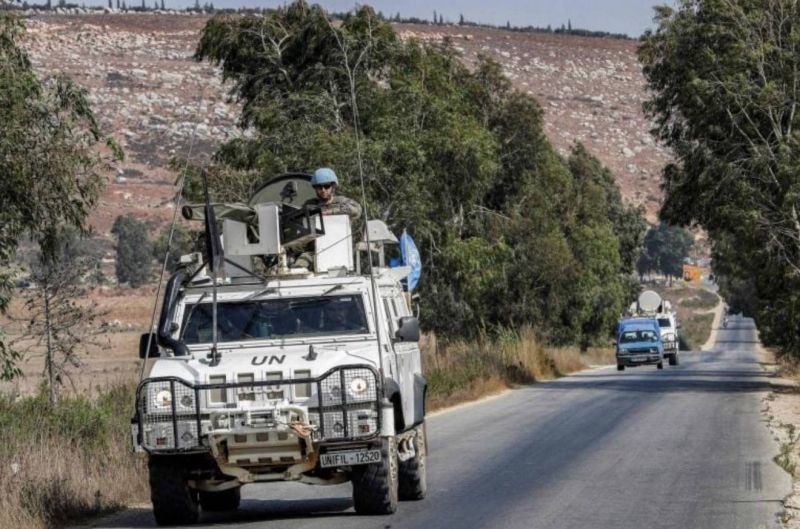
UNIFIL vehicles on patrol along the southern border near Khiam, August 30, 2022. (Credit: Mahmoud Zayyat/AFP)
For now, as long as the current calm along Lebanon’s southern border remains, there is no cause for immediate concern for the soldiers of the United Nations Interim Force in Lebanon (UNIFIL).
Despite the looming threat of the Gaza-Israel conflict spilling over into Lebanon, UNIFIL stated that it remains resolute and committed to its mission, echoing their stance during the Israel-Hezbollah war of 2006.
Since Hamas’ surprise attack on Saturday and after Hezbollah launched rockets toward the Kfarshouba area in south Lebanon, prompting Israeli retaliation, the UN peacekeepers have been on alert.
At this juncture, UNIFIL continues to carry out its mission and activities, albeit with slight adjustments in response to the changing circumstances.
The organization is assessing potential scenarios, with a primary focus on preventing the worst-case scenario: a scenario of escalated conflict in which South Lebanon becomes a battleground, potentially endangering the UN forces. UNIFIL’a peacekeeping forces do not have the right to retaliate in the event of war.
“We are no longer conducting routine operations,” UNIFIL spokesperson Andrea Tenenti told L’Orient-Le Jour.
“We have moved to operating at full capacity,” he said. “Our positions have shifted somewhat, especially in the wake of the rocket attacks from southern Lebanon into Israel,” he added, in response to claims circulating on social media that the UNIFIL forces abandoned their posts.
“These rumors are entirely unfounded,” Tenenti emphasized.
Part of the adjustments UNIFIL made since Saturday include a the activation of its rocket radars, which can effectively detect the trajectory of incoming projectiles.
They also now have access to bunkers, in case of escalation and missile fire.
During the July 2006 war between Israel and Lebanon, four peacekeeping soldiers died inside a bunker after their post was destroyed by an Israeli bomb.
Operating under a Chapter VI mandate, UNIFIL’s forces are solely responsible for peacekeeping, and have a number of tools at their disposal to help them achieve this goal. These tools include mediation and diplomacy, which have been particularly stepped up in recent days.
“The Commander-in-Chief of UNIFIL, Aroldo Lázaro Sáenz, is in constant contact with interlocutors in both countries to reduce tension and work toward de-escalation,” Tenenti said. “For the time being, both sides are willing to talk.”
“Their [UNIFIL’s] role is extremely important, particularly as regards liaison with the Lebanese army and government, since the command can talk to both sides in the event of escalation,” said a military source who requested anonymity.
‘We will not abandon our site’
For the time being, military strategists affirm that neither Hezbollah norIsrael, which still reeling from Hamas’ surprise operation, have any interest in opening a new fighting front on the border.
“Who will rebuild the homes destroyed in the event of war? Nobody,” said the military source.
Caretaker Foreign Minister Abdallah Bou Habib said on Sunday that Hezbollah guaranteed the caretaker government it would keep its distance from events in Israel as long as Tel Aviv does not provoke Lebanon.
Bou Habib said Hezbollah promised caretaker Prime Minister Najib Mikati it would not interfere in the ongoing war.
However, forecast and rational calculations so not always hold true in such unpredictable situations, where variables are plenty and surprise effects on the ground must be taken into account.
“At that point, the UNIFIL can exert all pressure and deploy every diplomatic resources but nothing would be done,” the military source added.
The UNIFIL command is well aware that it has neither the means nor the mandate to block anyone from initiating hostilities.
UNIFIL is therefore counting first, on the commitment of the parties involved, and second, on the fact that the UN force is made up of 10,000 soldiers from 49 different countries, each with its own political influence.
“It’s something of a deterrent,” Tenenti said. “There’s a lot we can do at this level.” One thing is certain, he said: “In the event of all-out war, we won’t abandon our site.We didn’t in 2006, and we won’t this time either.”
In the event of all-out war, UNIFIL’s mandate could be amended and placed under Chapter VII of the UN charter, which would give the multinational force the option of “using force and undertaking, by means of air, sea or land forces, any action it deems necessary to maintain or restore international peace and security” as espoused by article 42.
This is a decision that only the UN Security Council can make.
This article was originally published in French in LOrient-Le Jour.